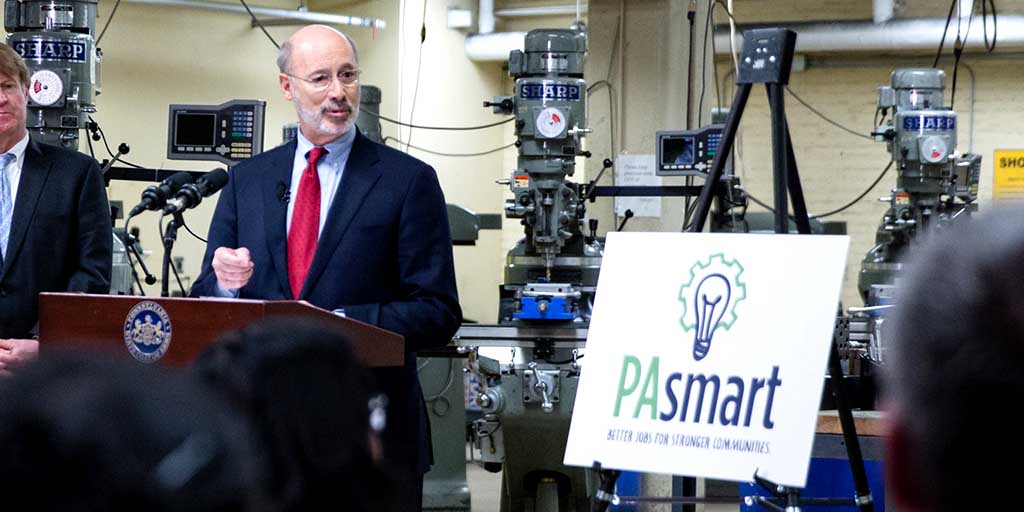Harrisburg, PA – Building on his commitment to strengthen our schools, build our workforce, and grow our economy, Governor Tom Wolf outlined his PAsmart initiative in the recently enacted 2018-19 state budget. As a first-of-its-kind $30 million investment, PAsmart will support workforce development through STEM and computer science education, apprenticeships and job training.
“PAsmart is a new and innovative way of connecting people with the training they need for in-demand middle class jobs that employers need,” said Governor Wolf. “By investing in people and skills to create a strong and talented workforce we can attract more businesses to Pennsylvania and grow our economy for everyone.”
PAsmart is built on recommendations of the governor’s Middle Class Task Force, which last year brought together the leaders from the Pennsylvania AFL-CIO, Pennsylvania Chamber of Business and Industry, education, and workforce development. At listening sessions throughout the commonwealth, the message was clear: there are jobs without trained people to fill them and some workers need new skills to get them, but a four-year college is not for everyone and a one-size fits-all approach will not work. Pennsylvania needs targeted investments in workforce development to strategically prepare for our economic future.
The demand for jobs in science, engineering, math and technology (STEM) and computer science is rapidly growing. Pennsylvania will have an estimated 700,000 open STEM jobs this year, and over the next decade, seven in ten new jobs will require workers to use computers and new technologies in a constantly changing economy.
PAsmart will:
- Increase STEM and computer science training for K-12 students;
- Increase the number of STEM and computer science educators;
- Expand job training through STEM and computer science “boot camps” to help adults change or advance their career.
“Pennsylvania is a national leader in STEM education, but we must do more to stay competitive in the global economy,” said Governor Wolf. “We must give students and experienced workers who need new skills the opportunity to prepare for these emerging high-demand jobs that can support a family.”
Earlier this year the State Board of Education, acting on the governor’s request to make computer science education available to all students, endorsed the Computer Science Teacher Association (CSTA) K-12 Standards. In STEM training, Pennsylvania is a national leader, ranking fifth for the number of STEM graduates and is home to five STEM learning ecosystems.
To develop a stronger workforce pipeline, by 2025, the governor has set a goal of increasing the number of workers with training after high school from 47 percent today to 60 percent, as well as doubling the number of registered apprentices.
PAsmart will:
- Invest $7 million to expand apprenticeships in traditional and non-traditional occupations, including youth pre-apprenticeship and registered apprenticeships at high schools and career and technical centers, and encourage businesses, community colleges and other higher providers to expand registered apprenticeships and work-based learning experiences for adults.
- Provide $3 million to build on the Department of Labor and Industry’s successful Industry Partnerships program, which connects similar businesses with educational and economic development partners to provide the job training.
“After restoring education funding over the past four years to get children started on the right path, this $30 million investment for PAsmart will help to build a first in the nation workforce,” said Governor Wolf. “PAsmart is the next step in my efforts to strengthen the economy, build a thriving business climate, and ensure Pennsylvania residents have access to good paying, middle class jobs.”
The funding will be disbursed by competitive grants administered by the Pennsylvania Workforce Development Board. Organizations eligible to apply include: local education agencies; intermediate units; postsecondary institutions; local workforce development boards; public libraries; employers; labor organizations; chambers of commerce; after-school providers; education, training and workforce providers; nonprofits; community organizations, and others.
PAsmart will also improve the effectiveness of workforce development programs by breaking down bureaucratic barriers and silos among state agencies to close gaps in job training.
As part of the PASmart initiative, the Wolf administration launched a new website earlier this year that is dedicated to helping people get information about pursing an education and career in Pennsylvania at any stage of life.



